English Edition
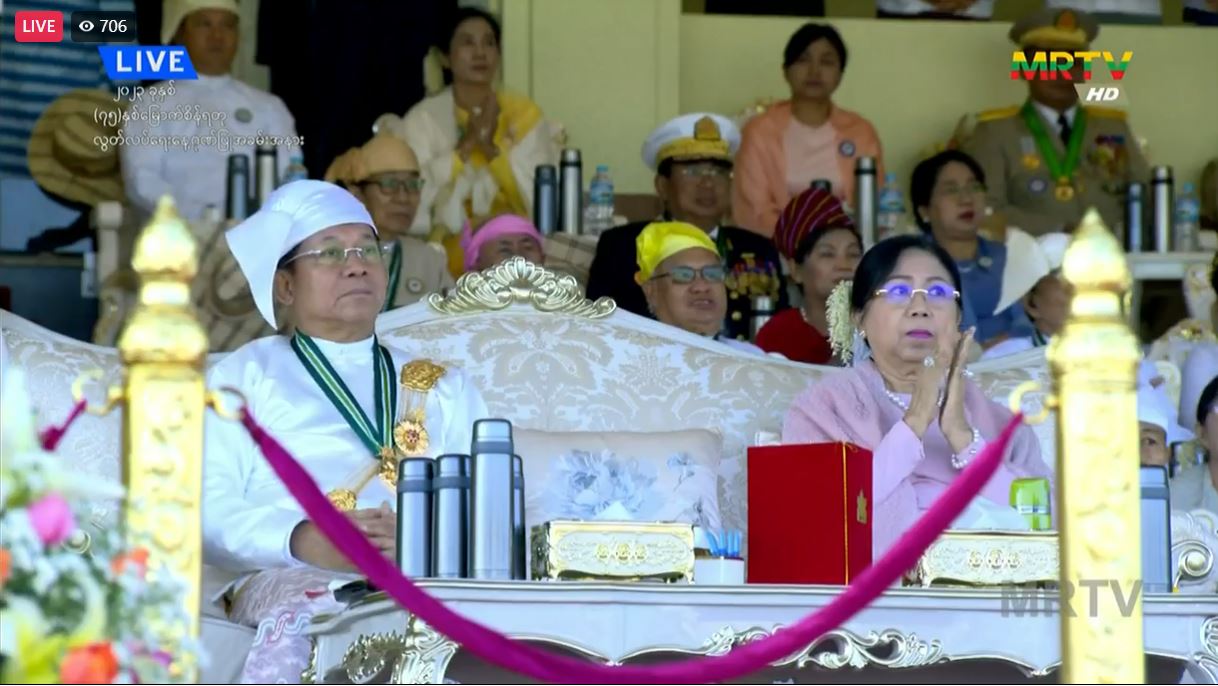
- By CNI News
- Category: English Section
- Hits: 616
CNI News
6 Jan 2023
As an extreme personality cult, which leads to division in the society and undermines national unity, is opposite to democracy, Snr Gen Min Aung Hlaing said.
He made the remarks in his speech on the 75th Anniversary of the Independence Day on 4th January, 2023.
He said, "People with diverse perspectives and goals could not be viewed as the adversary; they should not be subject to prejudice or exclusion because such beliefs are incompatible with democratic ideals. A cult of personality is opposite to democracy, which is not only detementral to union cohesion but also to social division."
He added that there are various interpretations of the federal system that use different norms. However, the expression implies cohesion and concordance in essence.
He continued to say," As rule of law is prerequisite to stable and strong democracy, no one is above the law. There are divergent views on democracy and the federal system when it comes to building a Union aspired by all ethnic nationals. Regardless of differences, it is crucial to choose a that best suits our country. Just as democracy calls for fulfilling the wishes of the majority, it is also required to heed the aspiration of the minority."
Myanmar regained independence from the British on 4th january, 1948 and thus this year marks the 75th Anniversary (Diamond Jubilee) of independence.
After regaining independence, differences of ideologies have led to armed conflicts until now.
As there are diverse opinions on building a democratic federal union, stakeholders are holding talks.
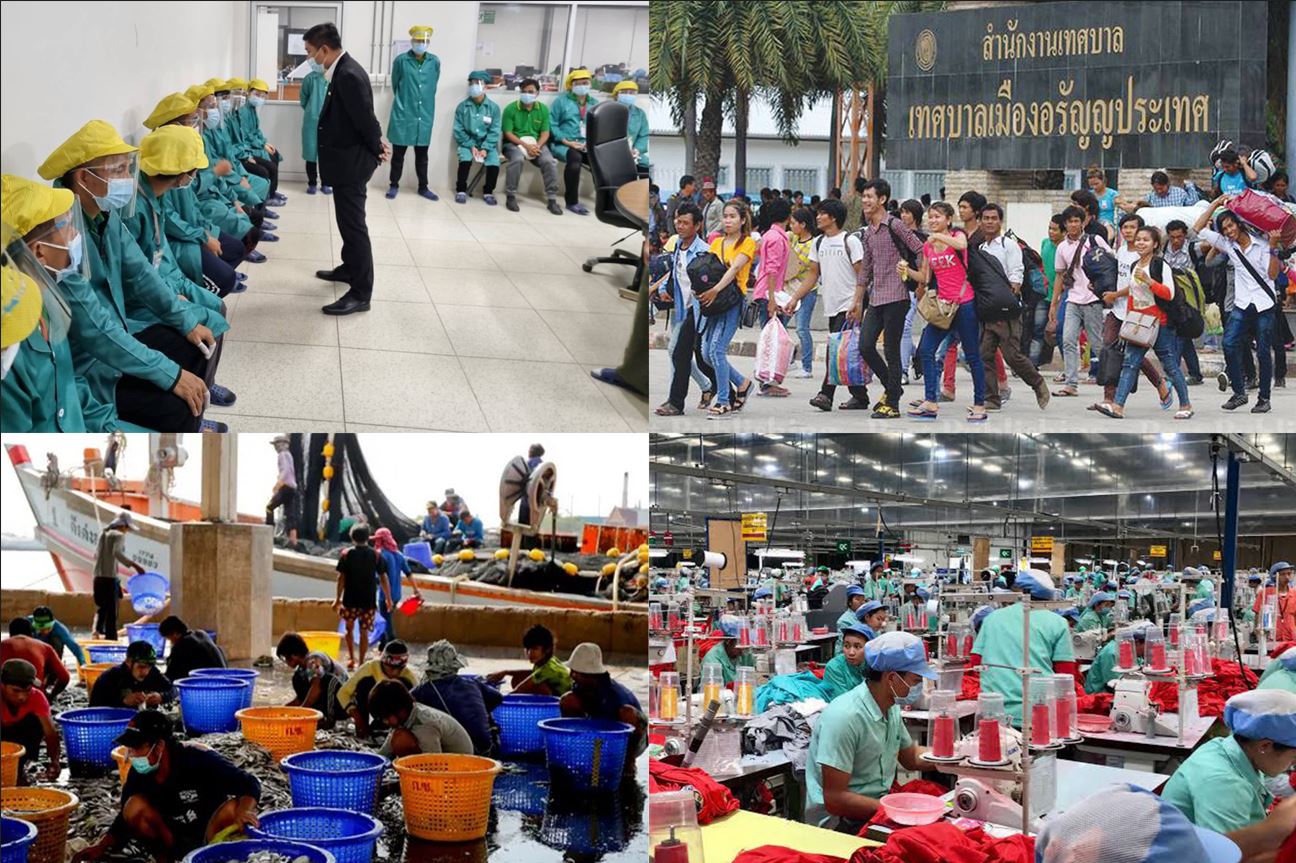
- By CNI
- Category: English Section
- Hits: 3508
CNI News
5 Jan 2023
As basic jobs in Thailand do not require educational qualifications and it is a neighbouring country migrants can travel easily to, Myanmar migrants should work there, labour activists told the CNI.
Thailand is a country Myanmar migrants should work because the basic wage in Thailand is much higher than that of Myanmar, Labour Activist Ko Thar Gyi in Thailand told the CNI.
He told the CNI, "Thailand is the best country Myanmar migrants should work. While a Myanmar basic worker earns less than MMK 300,000 per month, the monthly salary of a basic worker in Thailand is as much as MMK 700,000 at the current exchange rates. Thailand has set its basic slalry at Baht 9,000. At the current exchange rate of one Baht to MMK 61.12, a worker in Thailand earns more than MMK 700,000. As basic jobs in Thailand do not require educational qualifications and Thailand is a neighbour, it is the best country Myanmar migrants should work."
Most Myanmar migrants work in Thailand either officially or illegally and the flow of Myanmar migrant workers into Thailand has accelerated recently.
Millions of Myanmar migrants are working in Thailand because it is easy to travel to the country, jobs in Thailand do not require educational qualifications and language and the basic salary in Thailand is much higher than Myanmar, labour activists told the CNI.
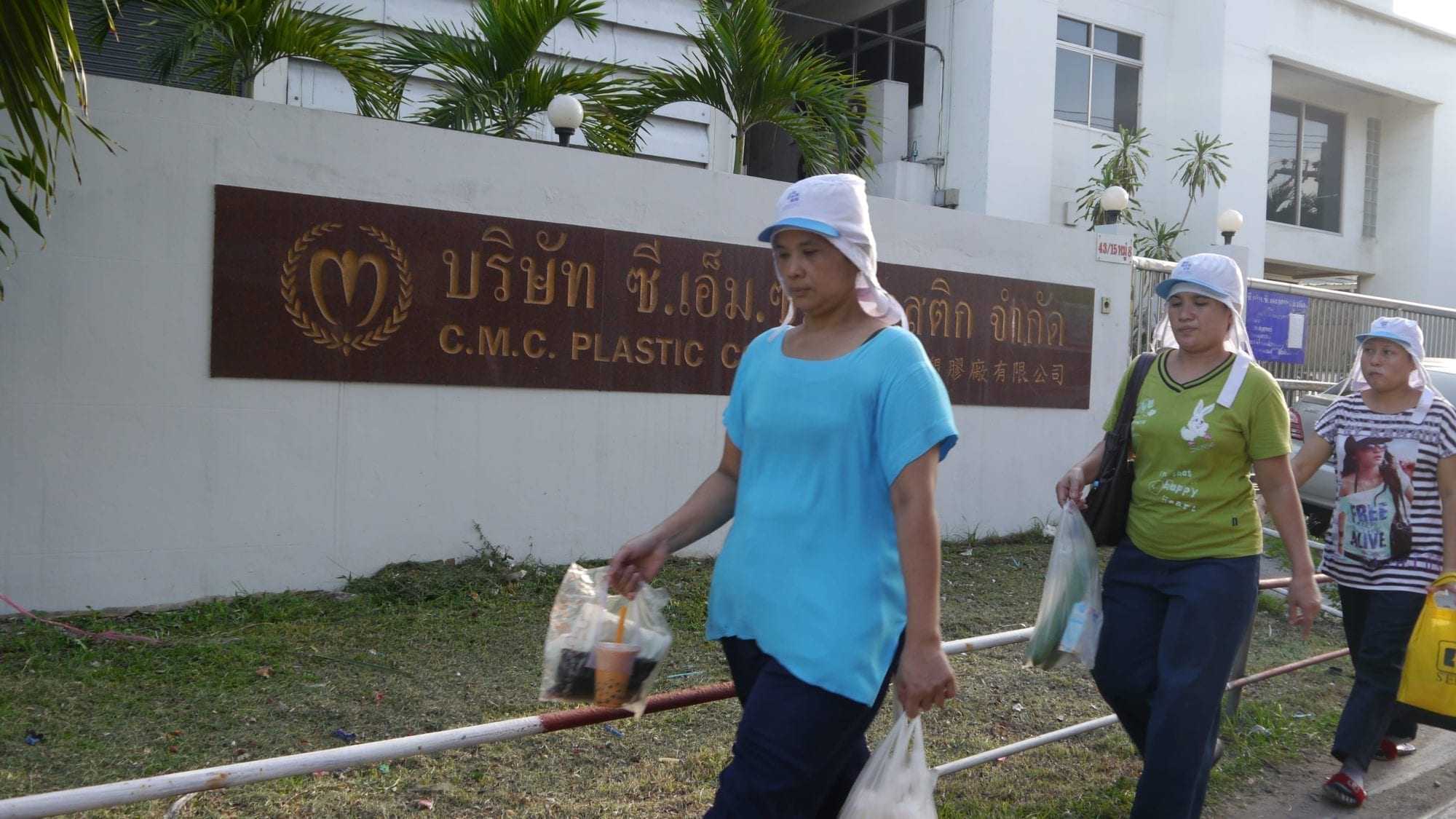
Workers in a plastic factory in Thailand.
In terms of the basic salary, Myanmar migrant should work in Thailand but it is not the best country for Myanmar migrants, Consultant U Aung Kyaw of the Migrant Workers Rights Network told the CNI.
He told the CNI, "I don't think Thailand is the best country for Myanmar workers because there are many other countries which are better than it in terms of wages, treatment and protection. Thailand has employed millions of Myanmar migrants for more than 30 years because it is easy to travel to Thailand at low costs and to get manual jobs. They are different from workers who go to Singapore, Malaysia, South Korea and Japan. However, when ordinary workers have faced difficulty to survive in Myanmar, they have no other choice except Thailand.
Social security system and labour laws of Thailand are sufficient enough to protect workers, according to labour activists.
However, there are disadvantages for Myanmar workers in Thailand and authorities are issuing documents by collecting extra fees, Labour Activist Ko Thar Gyi told the CNI.
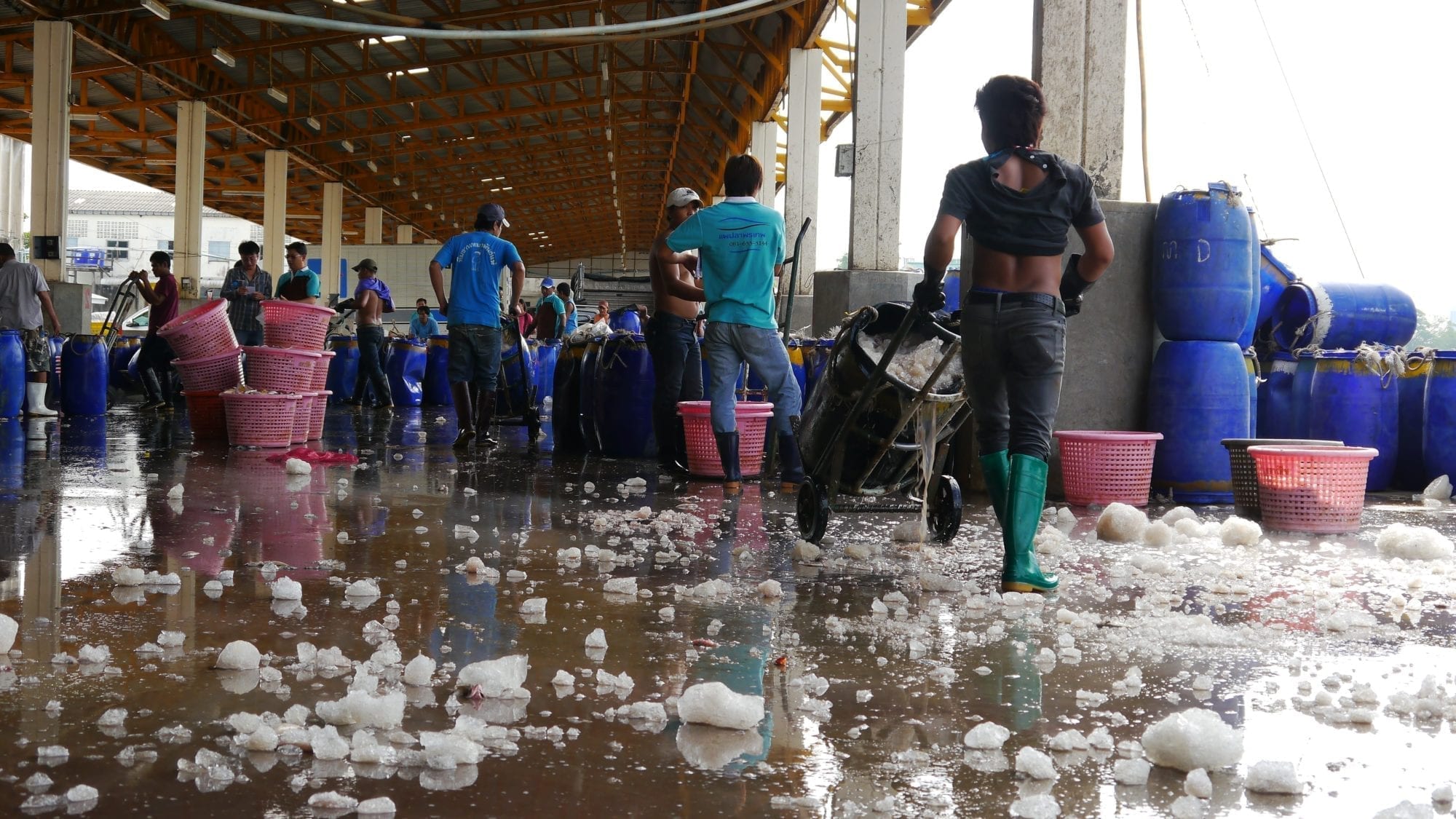
A fishery worksite in Thailand.
He said, "It is safe for Myanmar workers in Thailand if they have official documents of whatever kind. They can enjoy much higher wages than in Myanmar. If they come to Thailand illegally, Thai authorities tried to earn revenues by issuing work and stay permits for illegal workers, who had to pay authorities from Baht 15,000 to 20,000 last month. It can be said that the Ministry of Labour of Thailand failed to behave properly as a good neighbour because it issued pink cards to Myanmar workers by collecting unprecedented excessive amounts of money. And the pink cards are valid for less than a year."
Currently, Myanmar migrants are working in Thailand under the MOU between the two governments while some of them are working illegally.
Although some Myanmar workers went to Thailand under the MOU between the two countries, they failed to get the jobs in their employment contracts and faced other problems, according to labour activists.
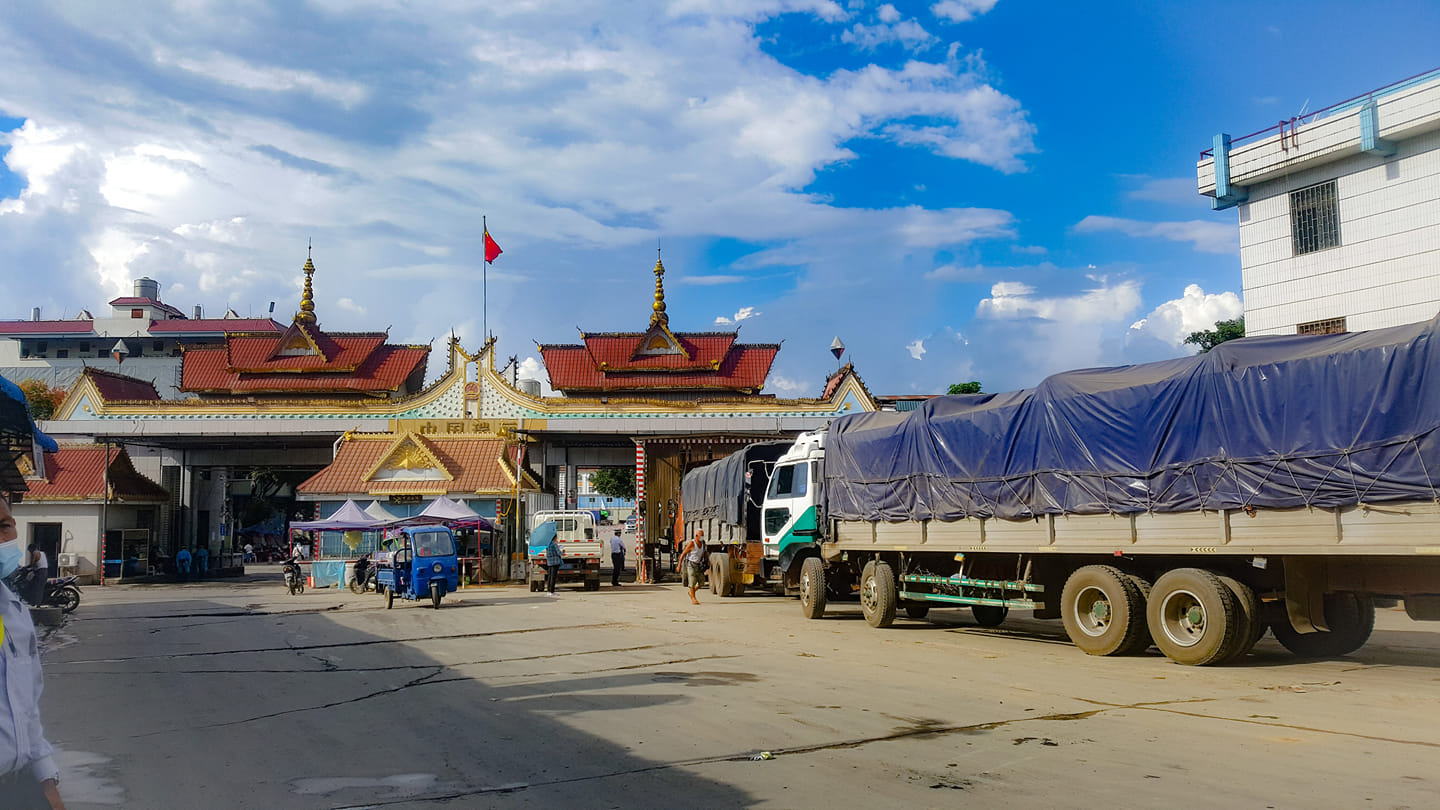
- By CNI
- Category: English Section
- Hits: 1255
CNI News
5 Jan 2023
China has officially issued an announcement that all Myanmar-Chinese border gates in Muse, which have been closed for almost three years, would be reopened starting from 8th January, according to border merchants in Muse.
The Chinese side has closed all border gates since early April, 2021 due to the outbreak of COVID-19 and the gates will be reopened on 8th January, 2023, Vice Chairman U Min Thein of the Muse Rice Exchange told the CNI.
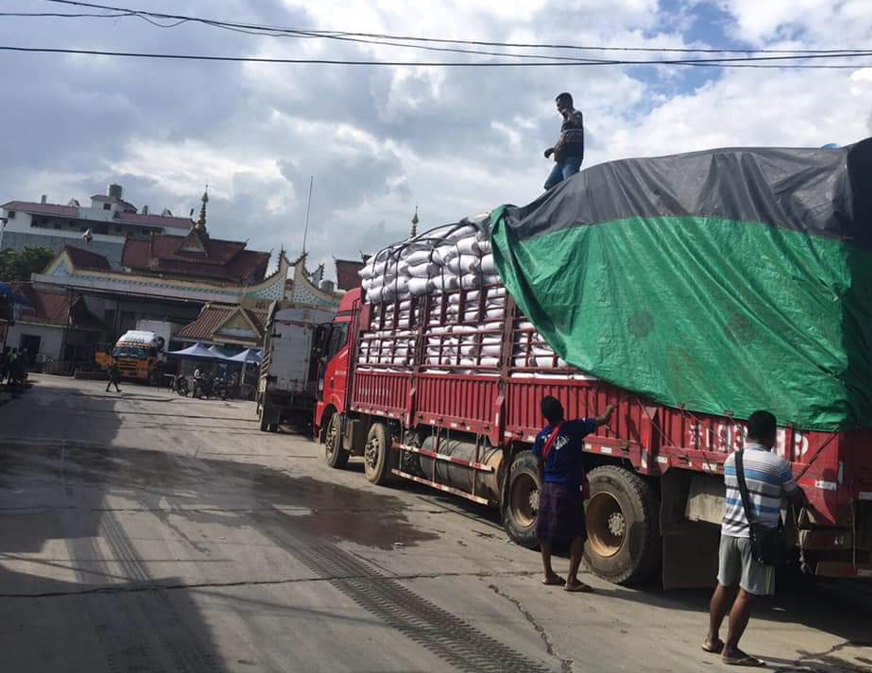
A border gate at the China-Myanmar border.
He said, "China issued a statement dated 2nd January to relevant authorities, stating that the Muse-Jiegao, Manwain, Hsinphyushin and Nandawgate would be reopened from 8 am to 11.30 pm, starting from 8th January." However, the statement did not clearly express how to handle COVID-19 restrictions despite opening the gates for trade and movement of people.
Although the border gates will be reopened soon, it is still necessary for Chinese authorities to ease COVID-19 restriction to return to normal before the outbreak of COVID-19, U Min Thein told the CNI.
He told the CNI, "The situation will gradually return to normal if Chinese authorities ease COVID-19 restrictions but this will not happen immediately. It could take about 6 months if Chinese authorities allow entries of people, vehicles, motorcycles and other vehicles to return to the situation before the pandemic in 2020."
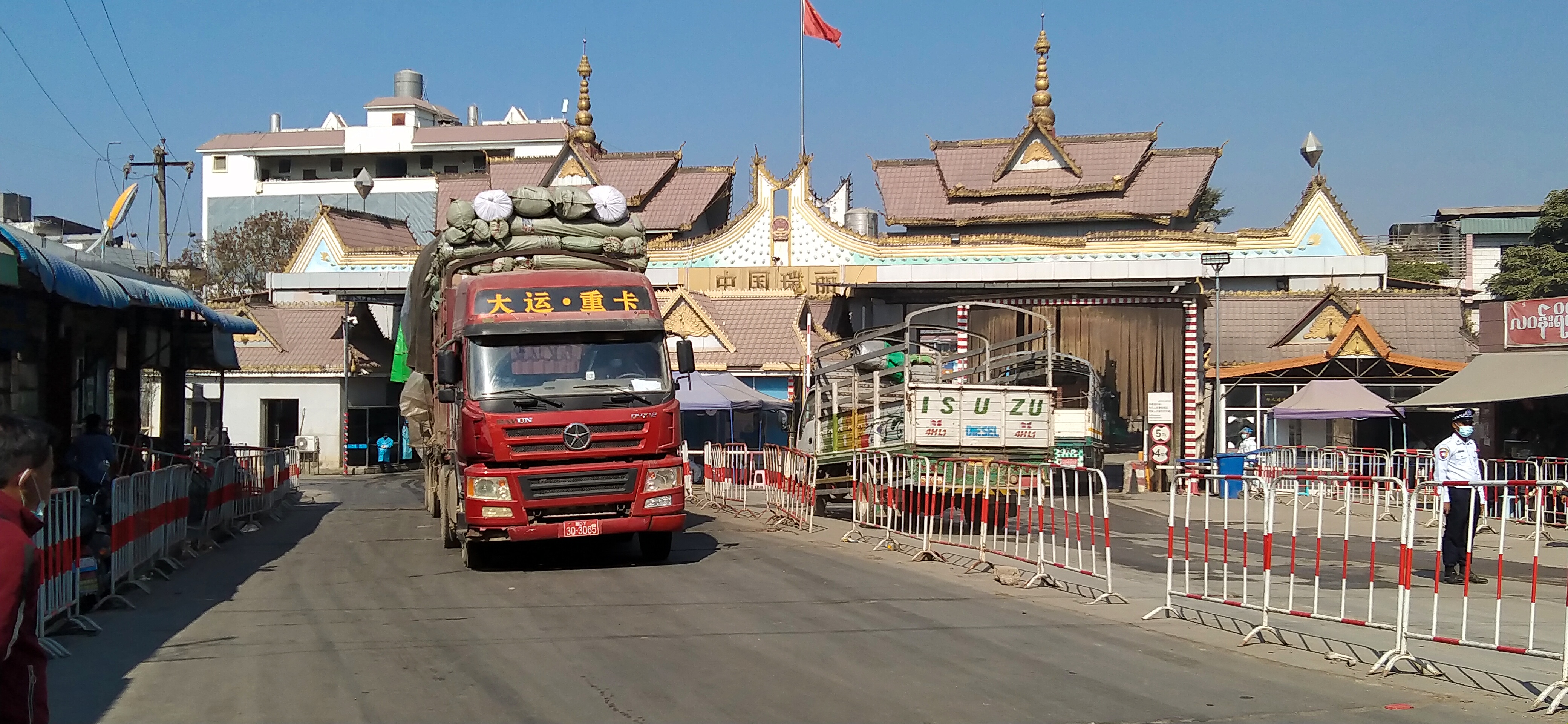
A border gate at the China-Myanmar border.
The border gates scheduled to reopen on 8th January include the Manwain Gate, which handles about 500 trucks a day, this will create trade and job opportunities for local residents.
As it is around the corner of the Chinese New Year, the watermelon market, which had almost collapsed previously, has recovered.
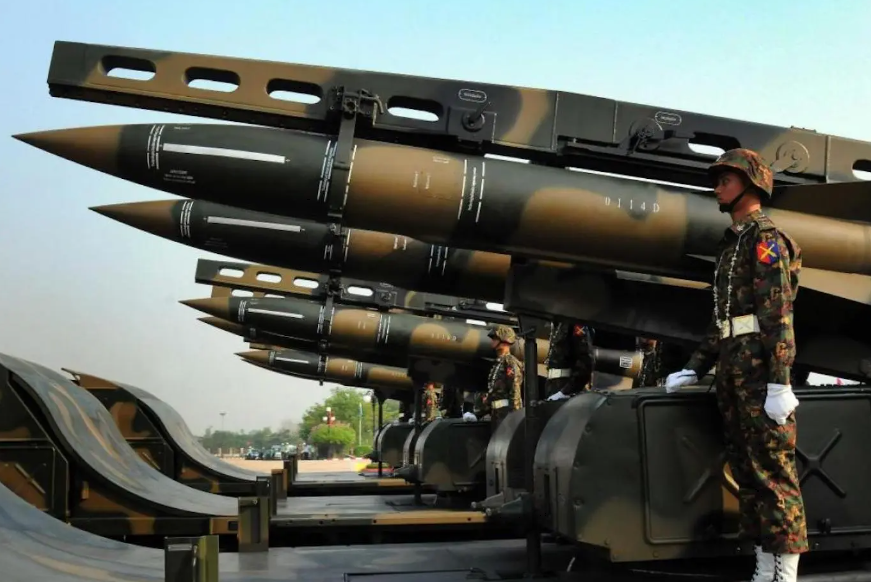
- By CNI
- Category: English Section
- Hits: 646
CNI News
5 Jan 2023
As its troops are overstretched, the Myanmar junta has declared a one-year ceasefire, Rakhine Politician U Pe Than told the CNI.
Despite declaring ceasefires, the junta launches operations by making various excuses, he added.
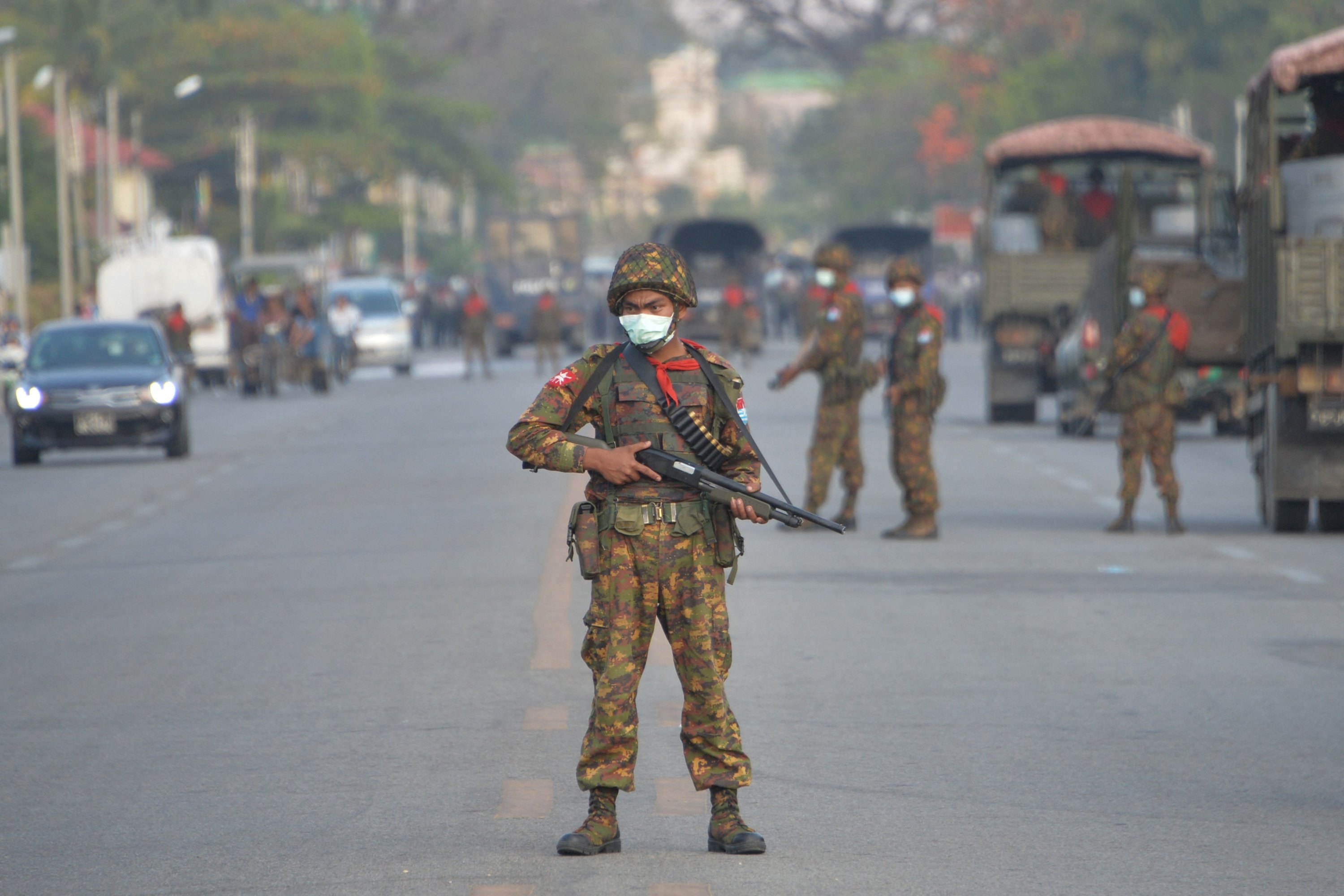
Security forces on duty. (GETTY IMAGES)
U Pe Than told the CNI, "They are just paying lip service and it doesn't mean anything but they will launch military operations and halt them when they think it is necessary to do so to when their troops are overstretched. Another factor is that they are creating a good image that they want peace and cooperating with ethnic armed groups as the 2023 elections are around the corner. They have often declared ceasefires again and again but armed clashes have erupted in the entire country. They are just creating an image that they want peace but they have to respond to the attacks of the opposition."
The Office of the commander-in-chief of defence services announced on 31st December, 2023 that it extended the ceasefire from 1st January, 2023 to 31st December, 2023.
As the military strategies have changed since the end of the Second World War, the junta is fighting against the resistance forces by saving its strength, Director U Thein Tun Oo of the Strategic Studies told the CNI.
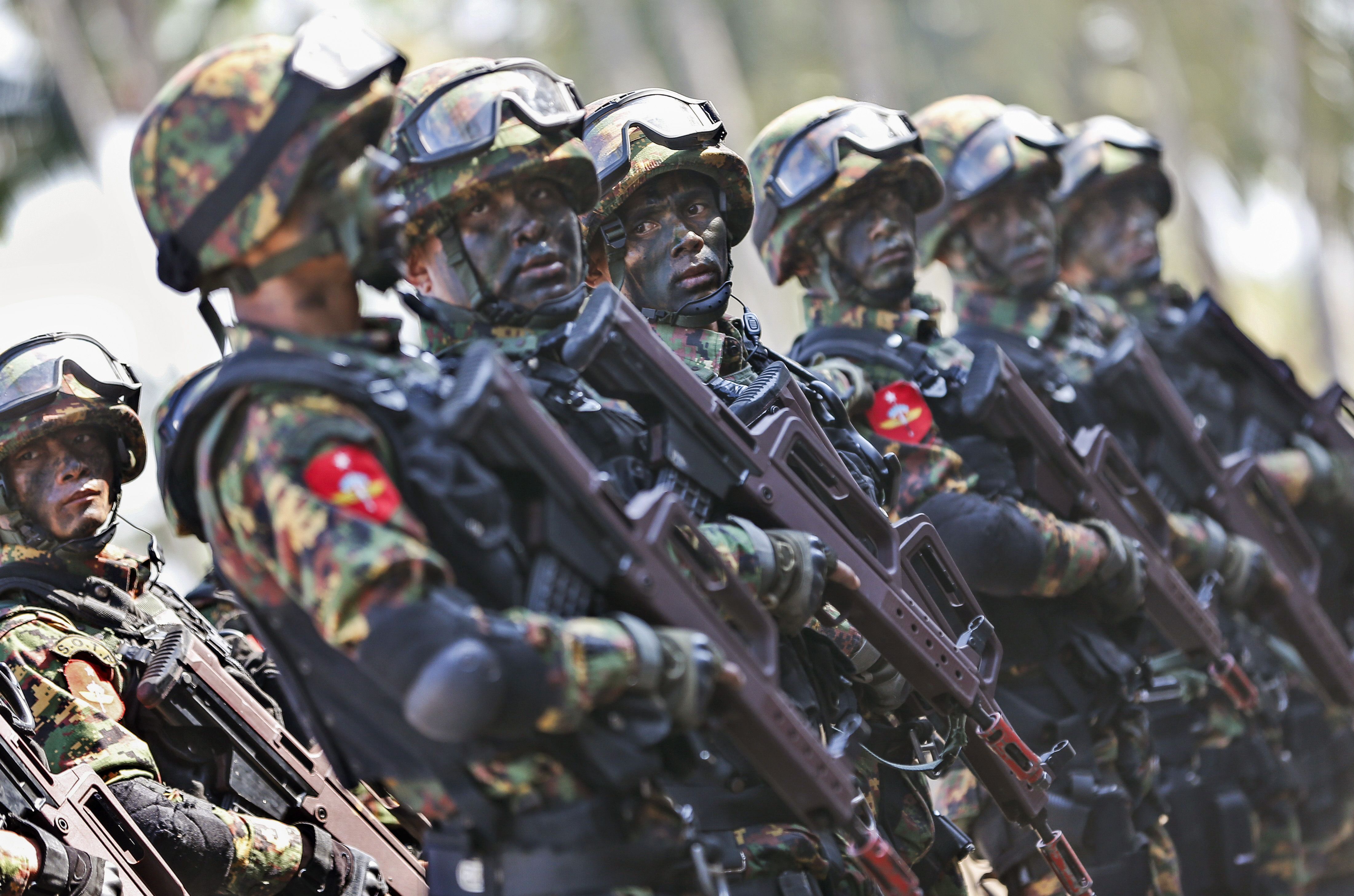
A commando team. (EPA)
He said, "Whenever we extended the ceasefire, the EAOs said our troops were overstretched. Military strategies and tacts have changed significantly since the end of World War II. Since then, militaries have saved their troops and heavily depended on weapons, smart weapons, precision weapons and guided weapons. So, ways of thinking that the ceasefire was announced because troops are overstretched is outdated. I think that they are not capable of thinking properly. I don't want to say much but it is quite opposite to the situation on the ground."
The Myanmar military has been announcing ceasefires for at least 21 times within more than four years since 21st December, 2018.

- By CNI
- Category: English Section
- Hits: 1088
CNI News
3 Jan 2023
Three Brotherhood Alliance made up of the Arakan Army, the Myanmar National Democratic Alliance Army and the Ta'ang National Liberation Army announced on 1st January that they would cooperate with certain popular revolutionary organizations amony the forces that emerged during the Spring Revolution.
They said they have sympathized with displaced persons due to domestic military and political instabilities caused after the Myanmar military ousted the civilian government, according to their statement.
The statement said, "Our three brotherhood Alliance will cooperate with certain popular and revolutionary organizations among the forces that emerged during the Spring Revolution to continue to take appropriate measures to achieve the common goal aspired by us and the entire people of Myanmar, to overcome the current crisis and to eliminate the military dictatorship."
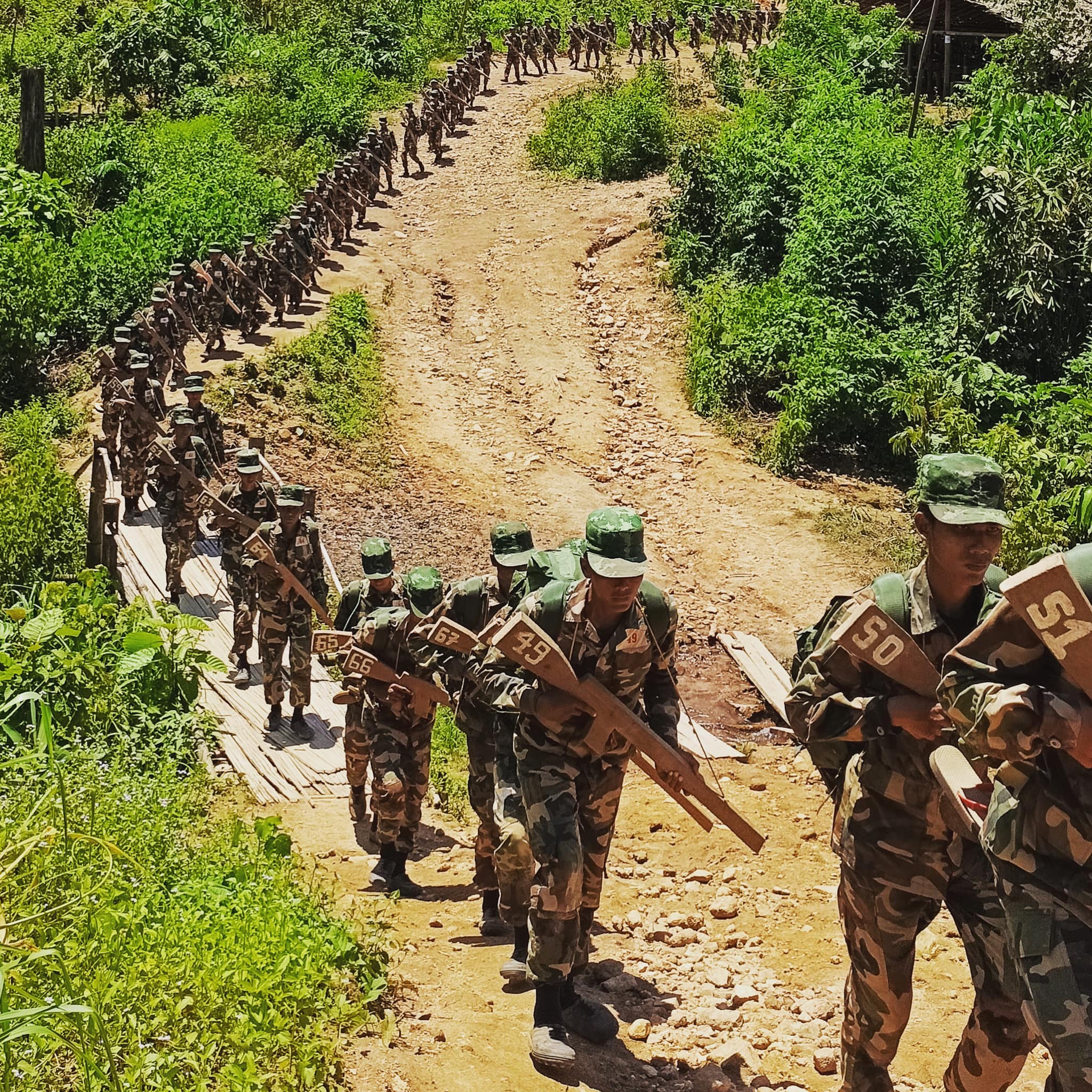
Troops of the BPLA. (BPLA-fb)
However, the statement did not elaborate on which popular and revolutionary organizations it was referring to. During the Spring Revolution, various organizations have emerged including the National Unity Consultative Council, the National Unity Government, the Committee Representing Pyidaungsu Hluttaw, the People's Defence Force, Local Defence Forces, the Karenni National Defence Force and the Bamar People's Liberation Army.
The Three Brotherhood Alliance has been fighting against the military relentlessly and their decision to join hands with revolutionary forces should be welcomed, Rakhine Politician U Pe Than told the CNI.
He said, "Their decision to join hands with revolutionary forces should be welcomed. We will have to wait and see how they choose revolutionary forces and what they will do. They will achieve success to a certain extent because the assistance offered by the US is linked to all anti-junta forces. I think they wanted to consolidate their strength."
The term revolutionary forces must be defined on their own standards but he welcomed the decisions to join hands with certain Spring Revolutionary forces, Political Observer U Than Soe Naing told the CNI.
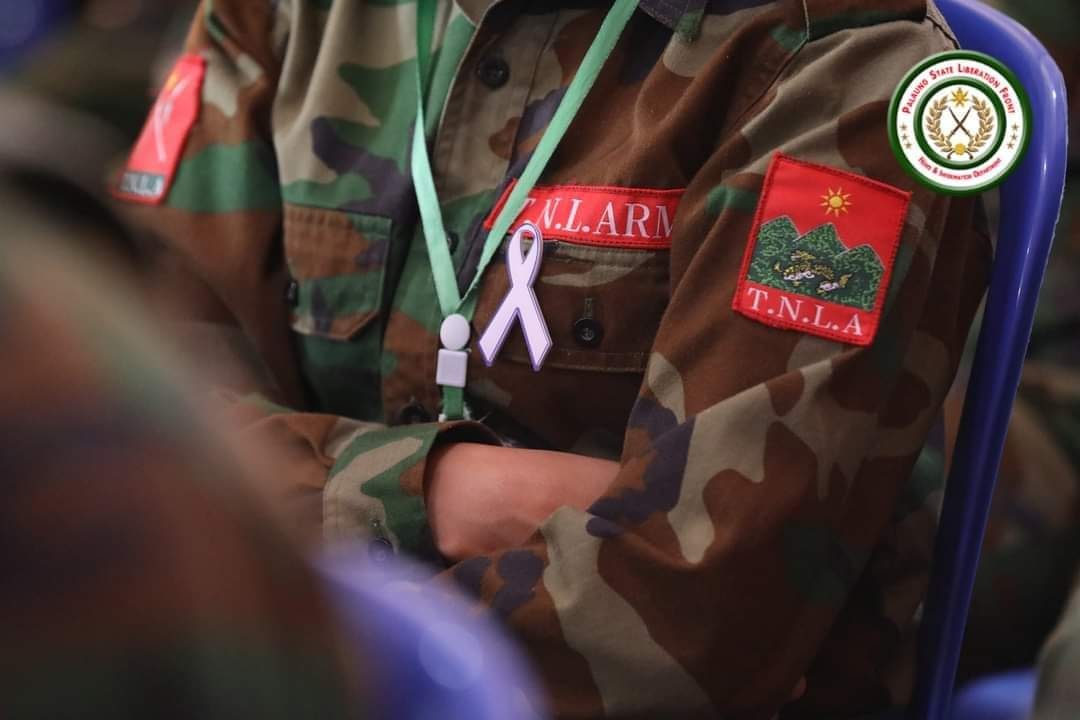
Troops of the TNLA.
He said, "I don't know how they will decide if an organization is revolutionary or not because they will do so on their own standards and ways and means. However, they are not under the direct leadership of Spring Revolution leaders like the NUG and the CRPH. It is difficult to say exactly which organizations they will cooperate with. We will have to wait and see. Nevertheless, they have recognized the Spring Revolution and decided to cooperate with it as necessary. So, we must welcome the move."
After the Myanmar military seized power on 1st February, 2021, peaceful protests and armed struggle have erupted in the country.
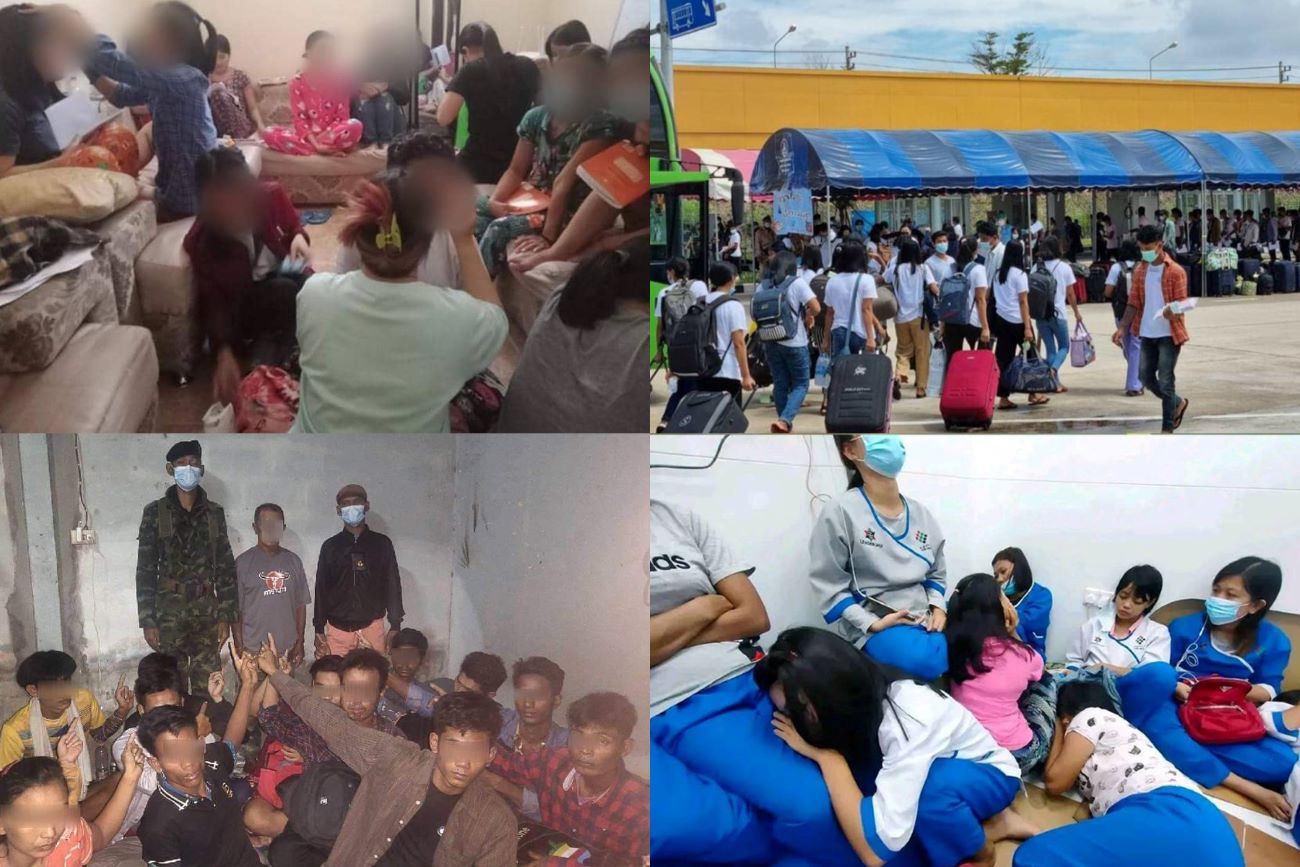
- By CNI
- Category: English Section
- Hits: 679
CNI News
3 Jan 2023
As relevant authorities have failed to take effective action, illegal overseas employment agencies are mushrooming in Myanmar, labour activists in neighbouring countries told the CNI.
Another reason is that those who fell victim to frauds of overseas employment agencies did not know how to file reports against illegal agencies and some of them were discouraged by legal fees and time required.
The main reason is that only a few victims of illegal overseas employment agencies filed reports about the latter, Ko Thar Gyi, a labour activist for Myanmar migrant workers in Thailand told the CNI.
He said, "Even if the victims filed complaints, staff failed to take effective action not only against officially registered agencies but also against illegal ones, who were recruiting migrant workers in samll town without licenses and relevant authorities. Failures to take action against them is also due to the situation in the country. As there is no rule of law in the country, staff do not take action against them and such frauds are mushrooming in Myanmar. I think all staff are involved in the cases. In the social media age, we know everything that is happening in Myanmar from Thailand in real time but it is impossible that authorities do not know the problems. To make the long story short, they are corrupted and unaccountable. Illegal agents took enormous fees from workers and sent them to agencies, which in turn bribe the authorities. So, authorities did not take action against them and crimes were undetected."

Migrants trying to work in Thailand under the MOU between Myanmar and Thailand.
Although agencies and agents have been in Myanmar for a long time, the number of them have significantly increased because a large number of Myanmar nationals are trying to work abroad.
However, the workers were cheated of their money by unlicensed agents who were unaccountable for securing a job when workers were abroad. As a result, workers face extreme hardship abroad.
In taking action against illegal overseas employment agencies, failure to arrest main culprits will not discourage them, U Babu Gyi, who has been helping Myanmar workers in Malaysia told the CNI.
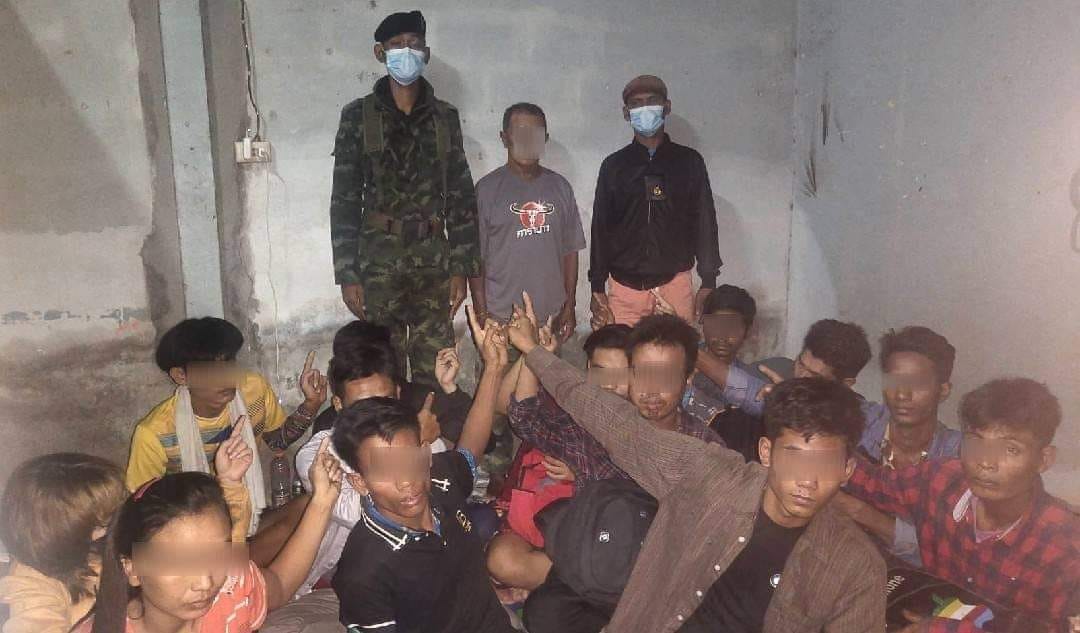
Detained illegal Myanmar migrants.
He said, "Illegal overseas employment agencies are mushrooming because authorities have fail to work effectively and it is difficult to combat such agencies. It is important that workers who intend to go abroad choose among agencies properly. Such agencies would manage to survive even if authorities took effective action. Even relatives like aunts and uncles are cheating workers of their money. They arranged for their nephews to work in Malaysia but when the workers arrived here, they could not find their nephews jobs. Eventually, the workers were detained by immigration authorities. They failed to take accountability for the detained workers. There are no agents who take accountability for workers they sent here. It is difficult to take action against them because they are bribing authorities. So, the main culprits are still at large and they are operating their illegal overseas employment agencies. It is almost impossible to combat them."
As overseas employment agencies do not have their company signboards, it is difficult to know whether they are operating officially or illegally.
As the Ministry of Labour is not responsible for launching operations against illegal overseas employment agencies on the ground, they have to rely on the public to file reports about illegal overseas employment agencies to township labour offices.
As the employment rate is very high in Myanmar, nearly 40,000 Myanmar workers are leaving the country every month, according to statistics released by the International Organization for Migration.
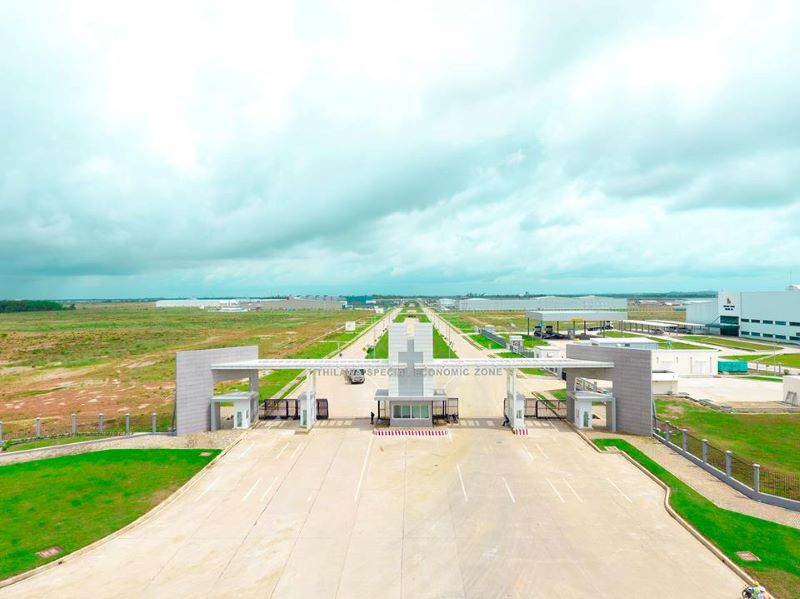
- By CNI
- Category: English Section
- Hits: 646
CNI News
3 Jan 2023
To attract foreign direct investment to Myanmar, the government is required to make accurate and convincing guarantees over the investment process, economic observers and entrepreneurs told the CNI.
FDI to Myanmar has been hampered by uncertainties of investment policies and weakness in the law.
As foreign companies invest their money in another country by studying the performance of its leadership, FDI mainly depends on them, Entrepreneur U Aung Pyae Sone told the CNI.
He said, "As far as we are concerned, the government has failed to make convincing guarantees to attract foreign investors. The government is required to explain the profits and protection for foreign investors in Myanmar and the accuracy of the foreign investment law. The government has been taking such measures but it still needs to do so more clearly. Another factor is that FDI mainly depends on the leadership of the government. Before a foreign company invests its money in another country, it studies the performance of itsleadership to decide whether the government pursues economic growth or religious faiths or military strength."
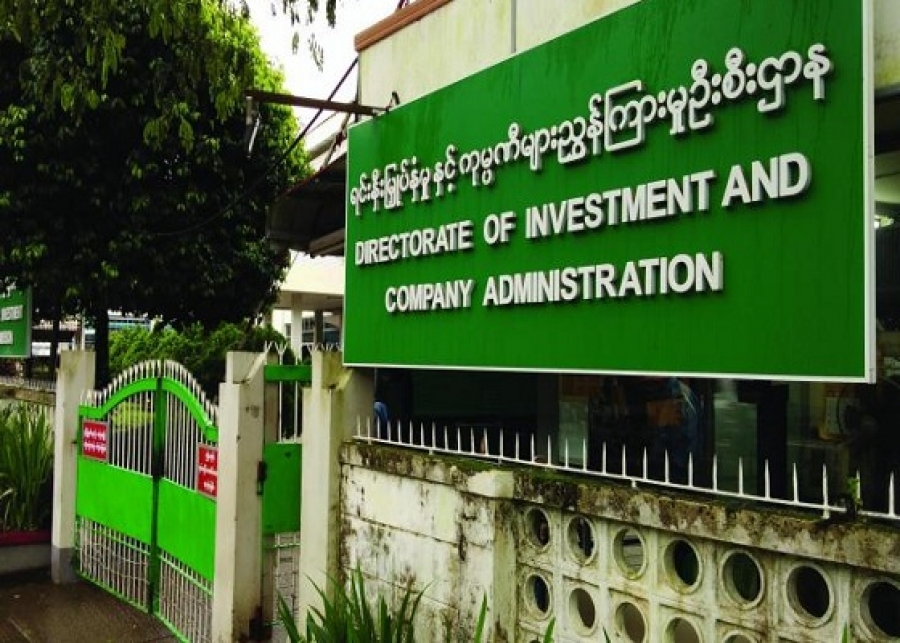
Directorate of Investment and Company Administration.
Even in a communist country like China, the leadership pursues economic growth and a large number of investors have scrambled into the second largest economy, he pointed out.
He said, "China is a communist country but it pursues economic growth. So, foreign investors scrambled into the country. Thailand attracts foreign investment through various ways and means. It offers opportunities for foreigners who buy condominium apartments in their country. They have promoted foreign investment in such ways. In our country, even existing foreign investors are hesitant to expand their operations, let alone attracting new foreign investors. So, there are many difficulties for foreigners whose languages, nationalities and natures are different from us. I just want to say that FDI depends mainly on leadership."
Entrepreneurs pointed out that it is necessary to effectively combat favouritism and corruption to attract FDI into Myanmar.
Land and labour have been available in Myanmar.
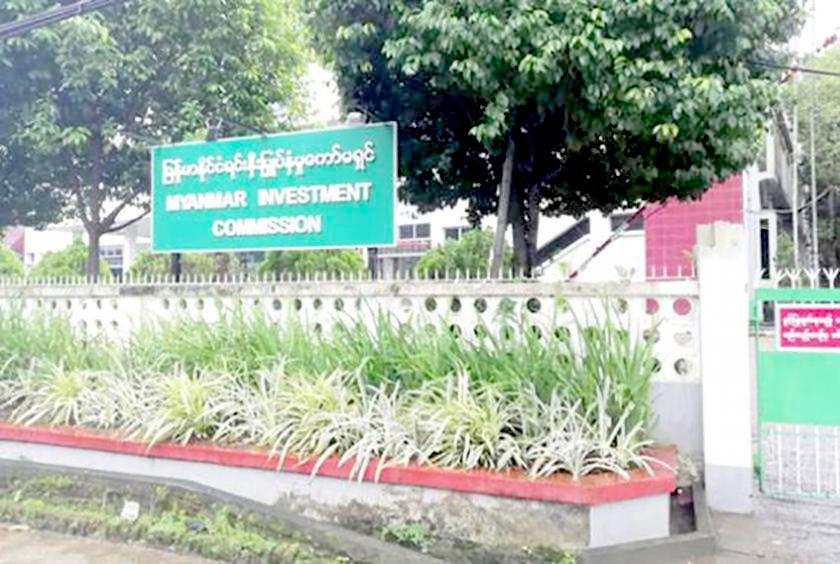
The Myanmar Investment Commission.
Moreover, foreign investors are hesitant to invest in Myanmar due to the political crisis and thus they will invest in Myanmar only after an elected civilion government takes office after the elections, economist and banking expert U Thet Zaw told the CNI.
He said, "FDI has been hampered by the political crisis. So, they are trying to hold the elections as soon as possible. After an elected government takes office, they will invest in Myanmar. I know much about Japanese and Chinese investors. They are waiting."
Moreover, five or ten or 15 years' tax exemption should be offered to investors in Dawei and Kyaukphyu SEZ in the same way as those in Thilawa SEZ are offered 5 years' tax exemption to attract foreign investments, according to entrepreneurs.
Entrepreneurs said priority should be given to garment and value added product industries which can create a large number of job opportunities, economists said.
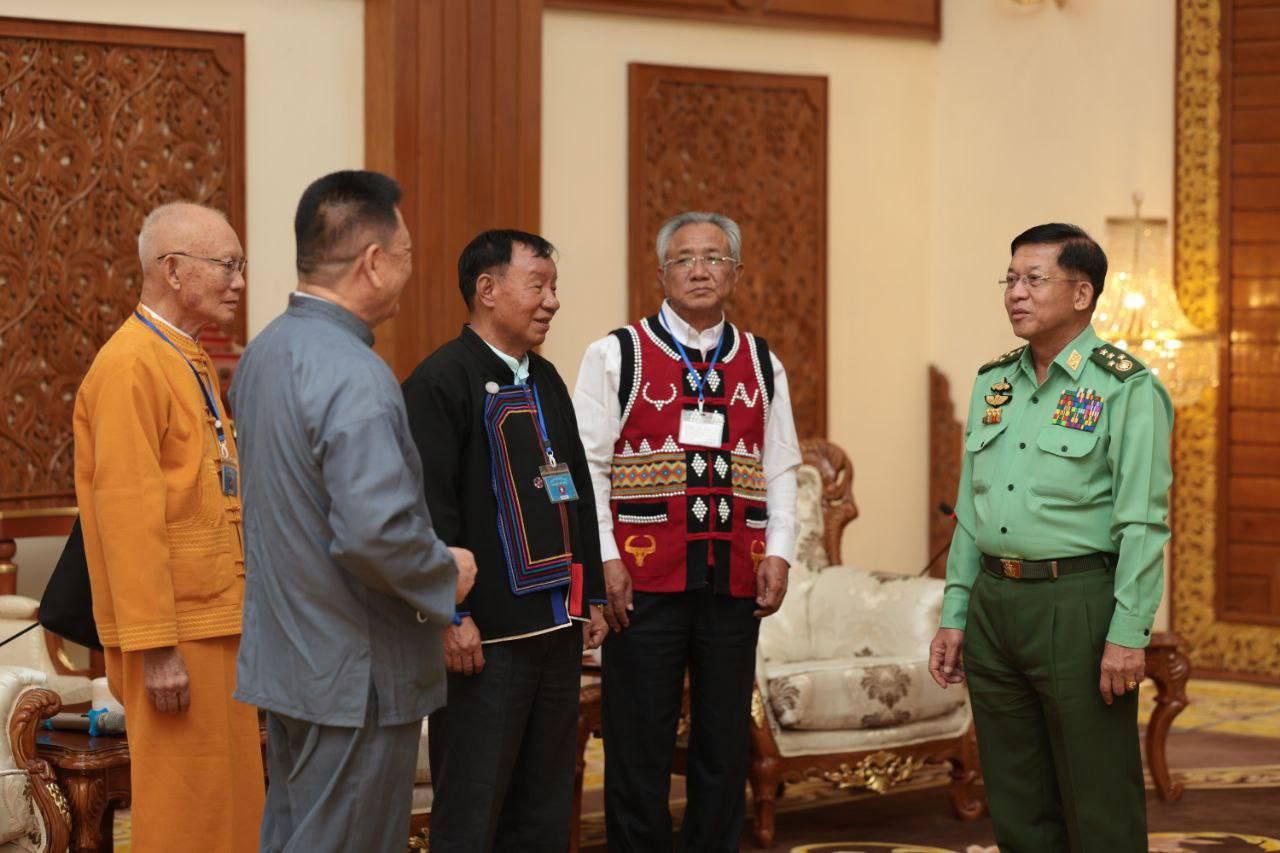
- By CNI
- Category: English Section
- Hits: 669
CNI News
1 January 2022
Political observers are raising questions whether the year 2022 was a peace year as claimed by the State Administration Council chairman.
With lawlessness and armed resistance in the entire country, the year 2022 stepped farther away from peace, General Secretary Sai Leik told the CNI.
Sai Liek said, "Absolutely not. The year 2022 is marked by the most fierce armed resistance without lawlessness in the entire country. It was a year that stepped farther away from peace."
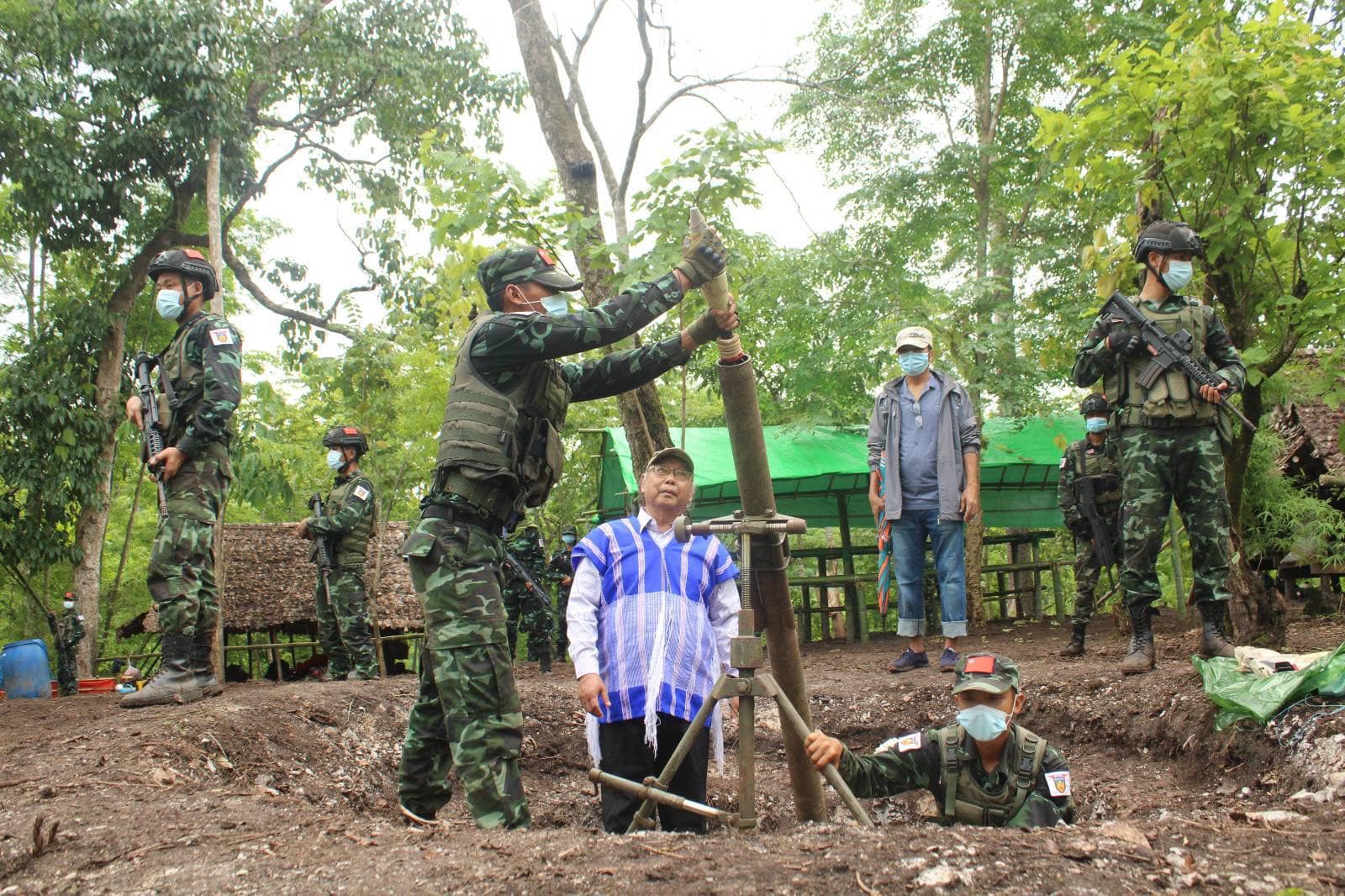
Mahn Win Khaing Than and PDFs.
The SAC chairman claimed that the year 2022 was the peace year and held talks with ten ethnic armed organizations.
Peace claimed by Snr Gen Min Aung Hlaing referred to peaceful resolution only with the ethnic armed organizations, Political Observer U Ye Tun told the CNI.
He told the CNI, "It is obvious whether peace can be restored or not. He was talking about peace deals not with the NUG and PDFs but with ethnic armed organizations. He said the NUG and PDFs were terrorists and must be eliminated. The NUG and PDFs also said that the military must be defeated and replaced by the people's army. So, they continue to fight each other."
Armed clashes broke out in the entire country in 2022 and it cannot be said that the peace process was successful, Political Observer U Than Soe Naing told the CNI.

Gen Yawd Seik and Snr Gen Min Aung Hlaing.
U Than Soe Naing told the CNI, "There were over 9,000 clashes between the PDFs led by the NUG and EAOs. More than 10,000 people were arrested and over one hundred people were sentenced to death. How can we say that the peace process was successful in 2022? The junta was holding talks with small armed groups which did not fight with it. So, the peace process was meaningless. It was a political joke."
Fighting has erupted between the military and resistance forces including the Kachin Independence Army, the Karenni National Progressive Party, the Chin National Front and the PDF in Karen State, Kayah (Karenni) State, Chin State, Magway Region and Sagaing Region.
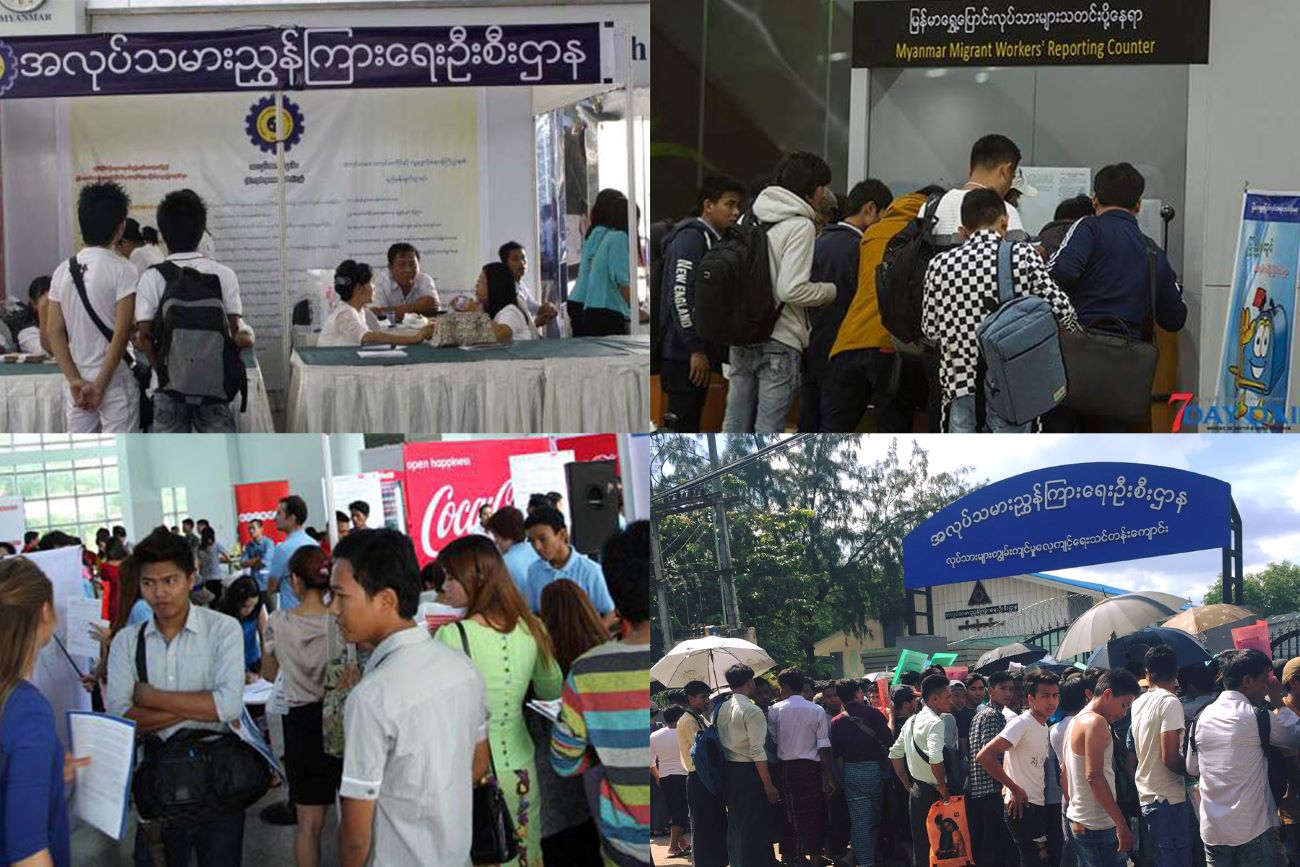
- By CNI
- Category: English Section
- Hits: 741
CNI News
1 January 2022
The public has been urged to file reports about illegal oversea employment agencies which are running operations in their wards and buildings to respective township offices of the Department of Labour, the Nrue News Information Team of the SAC told the CNI.
As illegal overseas employment agencies are operating in residential quarters, buildings and apartments are overcrowded and the issues have caused security concerns among the people living near them.
The official made the remarks when the CNI asked the department how to file reports about illegal overseas employment agencies and how it would take action against them.
The True News Information Team of the SAC responded, "The Ministry of Labour can investigate the cases together with other relevant authorities when they have received information about them. The public can file reports about them at relevant township labour offices."
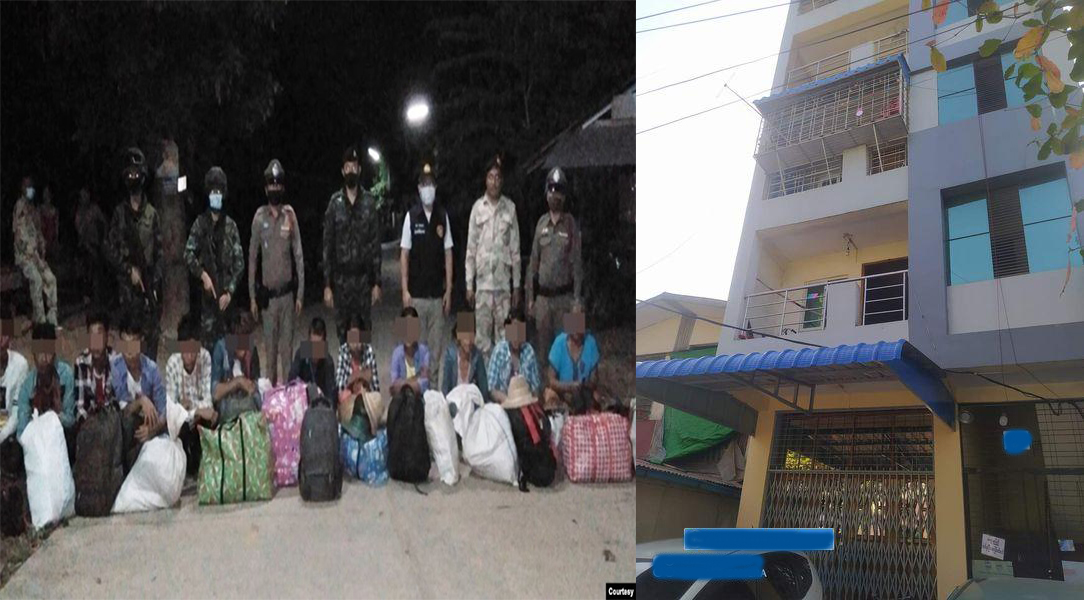
An apartment in Yangon and detained illegal migrant workers in Thailand.
Illegal overseas employment agencies operate in residential quarters without any licenses and allow migrant workers to stay in their apartments before sending them to Thailand from Yangon by car. As a result, residential quarters are overcrowded with strangers and the issues have caused security concerns among the people, said a person who lives in an apartment building in Ward-13 in South Okkalapa Township. He said an overseas employment agency was operating in one of the apartments in his building.
He said, "An overseas employment agency is operating in the building I live in. It doesn't have a company signboard. We don't know whether it is an official or illegal agency because it is not transparent. The agency allows migrant workers to stay in the apartment and send them to Thailand and Malaysia. Some of them stay there almost a week. We don't know who they are. Crimes are rampant in Yangon. As they go outside and come back very frequently, we have to leave the main entrance door unlocked. Unscrupulous people can break into apartments when owners go to work. Who is responsible for such incidents, the landlord or the agency? If they are sending workers abroad illegally, they are trafficking in humans. Authorities should take action against them. People from the building should file reports about them to authorities. I am filing reports about them."
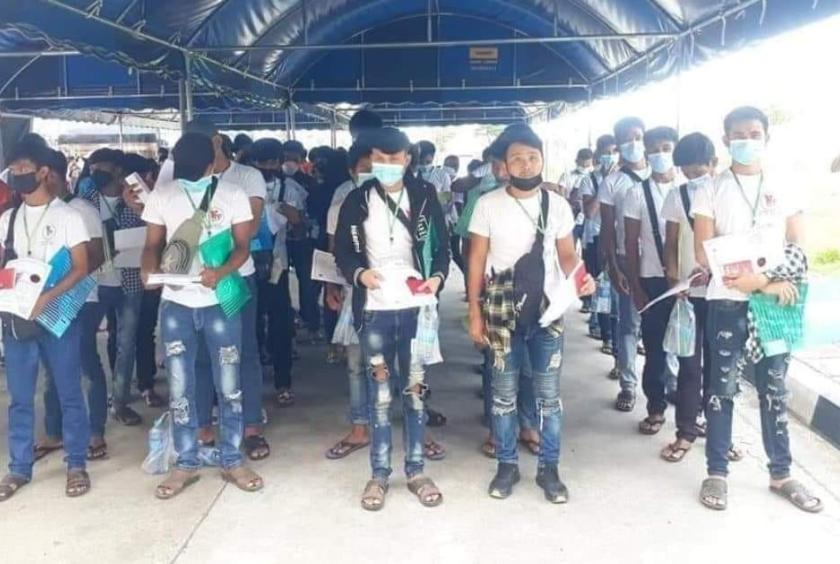
Myanmar workers sent to Thailand under the MOU between the two countries.
As a large number of people in Myanmar are trying to work abroad, overseas employment agencies and agents are mushrooming elsewhere.
As some agencies do not have company signboards, it is difficult for the public to know whether they are official agencies or illegal businesses.
People in Myanmar are working abroad through official agencies or illegal agencies and most of them go to Thailand, Malaysia, Japan, South Korea and Dubai.
As of last March, there are 324 overseas employment agencies that are registered with relevant authorities.
Action can be taken against illegal agents under the Anti- Trafficking in Person Law, Advocate U Aung Kyaw told the CNI.
"Trafficking in Persons" means recruitment, transportation, transfer, sa!e, purchase, lending, hiring, harbouring or receipt of persons after committing any of the following acts for the purpose of exploitation of a person with or without his consent such as ' threat, use of force or other form of coercion, abduction, fraud, deception, abuse of power or of position taking advantage of the vulnerability of a person, giving or receiving of money or benefit to obtain the consent of the person having control over another person.



